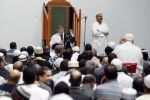French Muslims protest Paris’s ban on street prayer

PARIS — A ban on street prayer came into force on Friday, driving thousands of Muslim worshipers in northern Paris into an improvised prayer site in an old fire brigade barracks, angering Muslim minority.
The prayer ban has highlighted difficulties of five million French Muslims, who often lack spaces to pray.
The Interior Ministry under Claude Gueant has directed Paris’s Muslims to temporary spaces made available pending the construction of a new space and warned that force would be used if necessary as the police enforce the ban.
Seven months before a presidential election, the ban has struck some in France as an attempt to rally the far right to President Nicolas Sarkozy’s center-right camp.
At the fire barracks, Sheik Mohammed Salah Hamza oversaw prayers for Muslims who had arrived from all over the city. Worshipers streamed in, spreading their woven prayer mats over the floor of the hangar like building and out into the courtyard.
“It’s the beginning of a solution,” Sheik Hamza told Reuters before the start of the service. “The faithful are very pleased to be here. The space, which holds 2,000, is full.”
Many worshipers were also upbeat. “This will be better than Rue Myrha,” said one man, referring to a road in Paris where street prayers often take place. “Apparently, it shocked people.”
Ms. Le Pen has described the growing phenomenon of praying in the streets and sidewalks as an “invasion.”
“It’s Marine Le Pen who started all this,” a woman who gave her name as Assya said on her way into the former barracks on the outskirts of Paris.
In France, where a strict separation of church and state has been in force for a century, public displays of religious activity are frowned upon.
Yet efforts by Sarkozy’s conservative government to restrict religious displays, like a prohibition on full-face veils, have drawn criticism as empty measures that unfairly single out Muslims.
France counts the largest Muslim minority of any European country. Yet only a portion — about 10 percent, or the same proportion as the devout among Catholics — are practicing, according to Muslim associations.
An hour before the first prayer, young men with beards, green headbands and banners gathered on Rue Myrha to discourage worshipers from moving to the new site.
“No system in the universe can control us aside from Allah!” shouted one young man.
Another said, “There is more dignity in praying in the grass than in their false mosque.”
As the prayers began, dozens of young men belonging to a group called Forsane Alizza disrupted the service and jostled with security officers.







